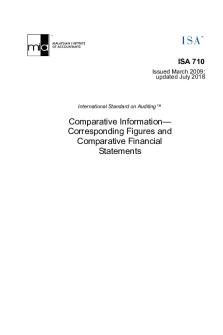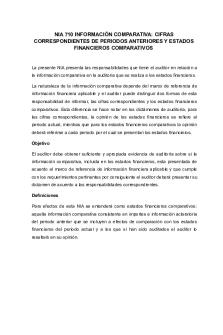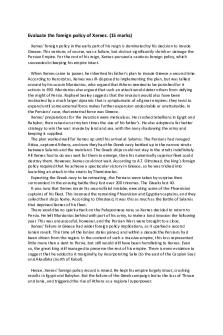POL-UA 710 U.S. Foreign Policy-SP21 PDF

| Title | POL-UA 710 U.S. Foreign Policy-SP21 |
|---|---|
| Author | Jackie Wang |
| Course | Management & Organizations |
| Institution | New York University |
| Pages | 5 |
| File Size | 196.7 KB |
| File Type | |
| Total Downloads | 80 |
| Total Views | 148 |
Summary
Download POL-UA 710 U.S. Foreign Policy-SP21 PDF
Description
POL-UA 710 U.S. Foreign Policy Department of Politics New York University Spring 2021 Professor: Vesna Danilovic Class Location: online Class schedule: W 5-7:30 pm Office hours: on Zoom by appointment - T 10-11 am, W 3-4 pm Course description This course is designed to introduce students to the historical and contemporary issues related to U.S. foreign policy. We will first review the history of American foreign policy in the 20th and 21st centuries with an emphasis on national security issues. Then the course will proceed with an in-depth coverage of major institutions and individuals involved in formulating American foreign policy. We will conclude with selected topics for debating and understanding major directions in current U.S. foreign affairs. Online seminar format All class sessions will be held online via Zoom at the scheduled class time. You will be able to join each class meeting through NYUClasses for this course, under the 'Zoom’ tab on the left. Please note that the sessions will be RECORDED and available to view again for the entire week after the session ends. If you have any difficulties accessing or using NYU Classes or Zoom, please contact their technical support. Required readings All required readings for the course consist of selected book chapters and journal articles. If not available through the NYU electronic journal holdings, they can be accessed on Classes/blackboard for this course (marked with *blackboard in the schedule below). The required readings should be completed before the lecture for which they are assigned. Students will also be expected to follow international currents and U.S. foreign policy on a regular basis by reading the relevant magazines during the term, such as The Economist (weekly) and Foreign Affairs (bimonthly). Grade policy Mid-Term Examination Final Examination
50% 50%
The exams will mainly consist of open-ended (short essay) questions though there will be a brief section of multiple-choice questions as well. There will be no makeup exams except in documented cases of serious medical emergency, military obligation, or jury duty. There are no extra credit assignments.
1
Practical Advice on Reading and Taking Notes For your own benefit and not just for this course, I strongly encourage you to read about research, repeatedly showing that taking notes with a laptop or tablet does NOT benefit a student’s cognitive and learning process. By contrast, “students who used longhand remembered more and had a deeper understanding of the material.” “A Learning Secret: Don’t Take Notes with a Laptop” (The Scientific American) http://www.scientificamerican.com/article/a-learning-secret-don-t-take-notes-with-a-laptop/
2
PART I: HISTORY & GLOBAL STRATEGY February 3 & 10 COURSE OVERVIEW; ANALYTICAL FRAMEWORK FOR STUDYING FOREIGN POLICY Snyder, Jack. 2004. “One World, Rival Theories.” Foreign Policy 145 (November/December): 52-62. Mead, Walter Russell. 2001. “Four American Foreign Policy Tradition.” In Special Providence: American Foreign Policy and How It Changed the World. New York: Alfred A. Knopf, pp. 86-96. *blackboard February 10 & 17 AFP HISTORY BEFORE WORLD WAR II & WWII DIPLOMACY LaFeber, Walter. 2008. “The US Rise to World Power, 1776-1945.” In M. Cox & D. Stokes (eds.) US Foreign Policy. Oxford: Oxford University Press, pp. 45-60 (Ch. 3). *blackboard Mead, Walter Russell. 2001. Special Providence: American Foreign Policy and How It Changed the World. New York: Alfred A. Knopf, pp. 3-29 (Ch. 1). *blackboard Document: Yalta Conference (1945) (http://avalon.law.yale.edu/wwii/yalta.asp) February 24 FROM CUBA TO VIETNAM & THE DETENTE ERA Document: Tonkin Gulf Incident (1964) (http://avalon.law.yale.edu/20th_century/tonkin-g.asp) Herring, George C. 1991. “America and Vietnam: The Unending War.” Foreign Affairs 70 (5):104-119. Hook, Steven W., and John Spanier. 2016. “Détente and World-Order Politics.” In American Foreign Policy Since World War II, 20th ed. Thousand Oaks, CA: CQ Press, pp. 102-125 (Ch. 5). *blackboard March 3 THE END OF THE COLD WAR & THE POST-COLD WAR CHALLENGES Paterson, Thomas, et al. 2010. “Between Two Worlds: Reagan, Bush, Clinton, and the Legacies of the Cold War.” In American Foreign Relations: Volume 2: Since 1895. Boston: Wadsworth, pp. 421-471 (Ch. 11). *blackboard March 10 U.S. GRAND STRATEGY FOR THE POST-COLD WAR & 21ST CENTURY Posen, Barry R., and Andrew L. Ross. 1996/97. “Competing Visions for U.S. Grand Strategy.” International Security 21 (3): 5-53. Art, Robert J. 1998/99. “Geopolitics Updated: The Strategy of Selective Engagement.” International Security 23 (3): 79-113. March 17 U.S. IN THE WORLD TODAY – A GLOBAL LEADER? Wright, Thomas. 2020. "The Folly of Retrenchment: Why American Can't Withdraw from the World." Foreign Affairs 99 (2): 10-18.
3
Wertheim, Stephen. 2020. "The Price of Primacy: Why American Shouldn't Dominate the World.". Foreign Affairs 99 (2): 19-29. Allison, Graham. 2020. "The New Spheres of Influence: Sharing the Globe with Other Great Powers." Foreign Affairs 99 (2): 30-40.
MID-TERM EXAMINATION March 24 PART II: GENERAL POLICY PROCESS & SELECT ISSUES Note: If you have not read the U.S. Constitution in its complete form, it is required that you do it before this second part of our class —get a hard copy or read it online United States Constitution. March 31 SOCIETAL INFLUENCES: PUBLIC, MEDIA & INTEREST GROUPS Jentleson, Bruce W. 2014. “The Domestic Context: Interest Groups, Media, and Public Opinion.” In American Foreign Policy: The Dynamics of Choice in the 21st Century, 5th ed. New York: W. W. Norton, pp. 56-85 (Ch. 3). *blackboard April 7 CONGRESS AND LEGISLATIVE-EXECUTIVE RELATIONS Document: War Powers Act (1973) http://avalon.law.yale.edu/20th_century/warpower.asp Lindsay, James M. 2003. “Deference and Defiance: The Shifting Rhythms of ExecutiveLegislative Relations in Foreign Policy.” Presidential Studies Quarterly 33 (3): 530-546. April 14 & 21 EXECUTIVE BRANCH: PRESIDENT & FOREIGN POLICY BUREAUCRACY Hastedt, Glenn P. 2012. “Presidency.” In American Foreign Policy, 9th ed. Upper Saddle River, N.J.: Pearson/Prentice Hall, pp. 167-192 (Ch. 7). *blackboard Aranson, Peter H. 1981. “Presidential Personality and Presidential Decision Making.” In American Government: Strategy and Choice. Cambridge, MA: Winthrop, pp. 434-438. *blackboard Clarke, Duncan L. 1987. “Why State Can’t Lead.” Foreign Polcy 66 (Spring): 128-142. (SELECT) ISSUES: April 28 TERRORISM Rapoport, David C. 2004. “The Four Waves of Modern Terrorism.” In Cronin, A. K. & Ludes, J. M. (eds.) Attacking Terrorism: Elements of a Grand Strategy. Washington, DC.: Georgetown University Press, pp. 46–73 (Ch. 2). *blackboard Cronin, Audrey Kurth. 2002/03. “Behind the Curve: Globalization and International Terrorism.” International Security 27 (3): 30-58.
4
May 5 HUMAN RIGHTS & DEMOCRACY PROMOTION Ignatieff, Michael. 2005. “Introduction.” In Michael Ignatieff, American Exceptionalism and Human Rights. Princeton: Princeton University Press, pp. 1-27. *blackboard Diamond, Larry. 2019. "Democracy Demotion: How the Freedom Agenda Fell Apart." Foreign Affairs 98 (4): 17-25. Krasner, Stephen D. 2020. "Learning to Live with Despots: The Limits of Democracy Promotion." Foreign Affairs 99 (2): 49-55.
FINAL EXAMINATION TBA [during the Final Exam week] ~ Have a Safe and Nice Summer ~
5...
Similar Free PDFs

Standard Auditing 710
- 19 Pages

ISA 710 - Lecture notes 3
- 19 Pages

Ensayo NIA 710 Y 720 del IMCP
- 12 Pages

Exercices courses pour le 710
- 3 Pages

Woodkids 300-710 Firepower dumps
- 35 Pages

Foreign- Exchange
- 3 Pages

US
- 10 Pages

Foreign currency
- 2 Pages

Foreign Marriage Act 1969
- 15 Pages

Sharia’H Foreign Exhange Trading
- 13 Pages

Foreign exchange exercises
- 8 Pages

Xerxes\' foreign policy - answer
- 1 Pages

FOREIGN REMITANCE INWARD
- 17 Pages
Popular Institutions
- Tinajero National High School - Annex
- Politeknik Caltex Riau
- Yokohama City University
- SGT University
- University of Al-Qadisiyah
- Divine Word College of Vigan
- Techniek College Rotterdam
- Universidade de Santiago
- Universiti Teknologi MARA Cawangan Johor Kampus Pasir Gudang
- Poltekkes Kemenkes Yogyakarta
- Baguio City National High School
- Colegio san marcos
- preparatoria uno
- Centro de Bachillerato Tecnológico Industrial y de Servicios No. 107
- Dalian Maritime University
- Quang Trung Secondary School
- Colegio Tecnológico en Informática
- Corporación Regional de Educación Superior
- Grupo CEDVA
- Dar Al Uloom University
- Centro de Estudios Preuniversitarios de la Universidad Nacional de Ingeniería
- 上智大学
- Aakash International School, Nuna Majara
- San Felipe Neri Catholic School
- Kang Chiao International School - New Taipei City
- Misamis Occidental National High School
- Institución Educativa Escuela Normal Juan Ladrilleros
- Kolehiyo ng Pantukan
- Batanes State College
- Instituto Continental
- Sekolah Menengah Kejuruan Kesehatan Kaltara (Tarakan)
- Colegio de La Inmaculada Concepcion - Cebu


